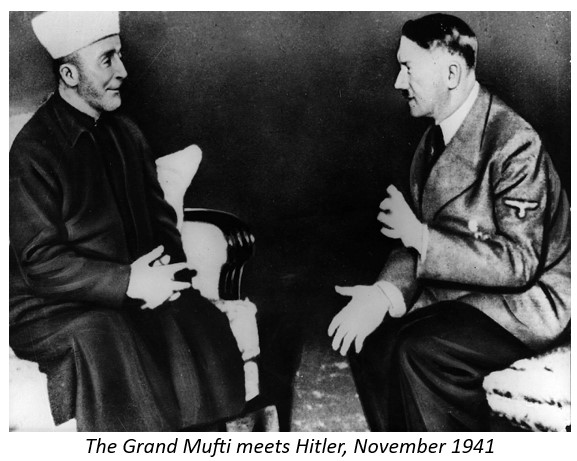THE ENGLISH GODFATHER OF PALESTINIAN TERRORISM
 [Welcome to this Monday’s edition of TTP Archives, to reprise a TTP article of years ago and to ask what you think how it applies to today on the Forum. ‘The English Godfather of Palestinian Terrorism’ was originally published on December 15, 2003. Twenty years later, the headlines of the last few days are full of reports on Palestinian terrorist attacks on Israel with Israel responding with air strikes on their locations in Gaza. So it’s timely to be re-familiarized with how this started with one Englishman deranged with Anti-Semitic hatred. The TTP Team is looking forward to your thoughts on the Forum!]
[Welcome to this Monday’s edition of TTP Archives, to reprise a TTP article of years ago and to ask what you think how it applies to today on the Forum. ‘The English Godfather of Palestinian Terrorism’ was originally published on December 15, 2003. Twenty years later, the headlines of the last few days are full of reports on Palestinian terrorist attacks on Israel with Israel responding with air strikes on their locations in Gaza. So it’s timely to be re-familiarized with how this started with one Englishman deranged with Anti-Semitic hatred. The TTP Team is looking forward to your thoughts on the Forum!]
TTP, December 15, 2003
The founder of the Palestinian terrorist movement was Amin al-Husseini (1897-1974).
As Grand Mufti of Jerusalem, he organized Arab rampages killing Jewish settlers in Palestine throughout the 1920s, and formed an alliance with the Nazi Party of Germany in the 1930s.
He met with Adolph Hitler in Berlin in November 1941 to encourage him to slaughter Jews in Europe so they couldn’t escape to settle in Palestine, and ordered Arab families to flee Israel upon independence so Arab armies could invade in 1948.
As one of the founders of Palestine Liberation Organization, he mentored his nephew Rahman Abdul Rauf al-Qudwa al-Husseini, and turned the leadership of the PLO over to him.
His nephew assumed the alias of Yasser Arafat.
But just how did Amin al-Husseini become Grand Mufti?
Ottoman law recognized the Mufti as the leader of the Moslem community in Palestine. When the previous Mufti, Kamel al-Husseini, died in March of 1921, the British ruled Palestine, having taken it from the defeated Ottomans in WWI and proclaimed it was to become the Jewish National Homeland.
(Actually the 1/3 that was left after a small army of Abdullah, the son of the Sharif of Mecca, had just seized the other 2/3 east of the Jordan River earlier in the month).
Ottoman law decreed that the Mufti was to be selected from among three candidates nominated by the Moslem Council of Jerusalem. Ronald Storrs, the British Governor of Jerusalem, announced this would be adhered to. The Council declared their election of the three candidates — and Amin al-Husseini, Mufti Kamel’s much younger brother, was not one of them.
24 years old, Amin was a fugitive hiding in Syria after being sentenced to ten years in prison the previous year (1920) for organizing Arab riots that beat up, killed, and raped a number of Jews in Jerusalem’s Old City.
Yet simultaneously in April of 1921, Amin’s sentence was revoked, the candidates of the Moslem Council were ignored, and Amin al-Husseini — insultingly young to a patriarchal society that reveres male elderhood — was declared by the British Governor to be Mufti of Jerusalem.
All of this was achieved by an unknown English functionary — a rabidly anti-Semitic member of the British High Commissioner’s Secretariat and the homosexual boyfriend-roommate of Ronald Storrs named Ernest Tatham Richmond (1884-1955).
The bond between Richmond and Amin al-Husseini was a bottomless hatred of Jews. Zionism, Richmond wrote, is “dominated and inspired by a spirit which I can only regard as evil.” He persuaded his boyfriend Storrs to install Amin as Mufti as part of his crusade to prevent the creation of a Jewish state.
Richmond looked upon Amin’s organizing murderous Arab riots against Jews in 1920 not as a black mark against him but the specific reason why Amin deserved to be Mufti — as he was the best person to continue organizing such riots and inflaming Arab passions.
Although Richmond failed in the end, through his protégé as Mufti he delayed the creation of Israel by over a quarter of a century and condemned Palestinian Arabs to lives of hate and misery for generations.
To the extent that Amin al-Husseini persuaded Hitler to launch in early 1942 a Final Solution for Jews, Richmond is further responsible for the horror of the Holocaust.
In one calamitous stroke hidden to history, Ernest Richmond prevented a peaceful Middle East, and stymied the dream of Winston Churchill, who as British Colonial Secretary explained to a delegation of Moslem Arabs in Jerusalem on March 30, 1921:
“It is manifestly right that the scattered Jews should have a national center and a national home to be re-united. And where else but Palestine, with which for 3,000 years they have been intimately and profoundly associated?
We think it will be good for the world, good for the Jews, good for the British Empire, but also good for the Arabs who dwell in Palestine… (for) we intend that they shall share in the benefits and progress of Zionism.”
This was not to be so — due to the pathology of a single compatriot of Churchill’s, so lowly that Churchill never knew of his existence.
Because of the hate that poisoned the soul of this unknown man, the world continues to be tormented by the depraved legacy of Ernest T. Richmond.
(Source: A Peace to End All Peace: The Fall of the Ottoman Empire and the Creation of the Modern Middle East by David Fromkin.)

